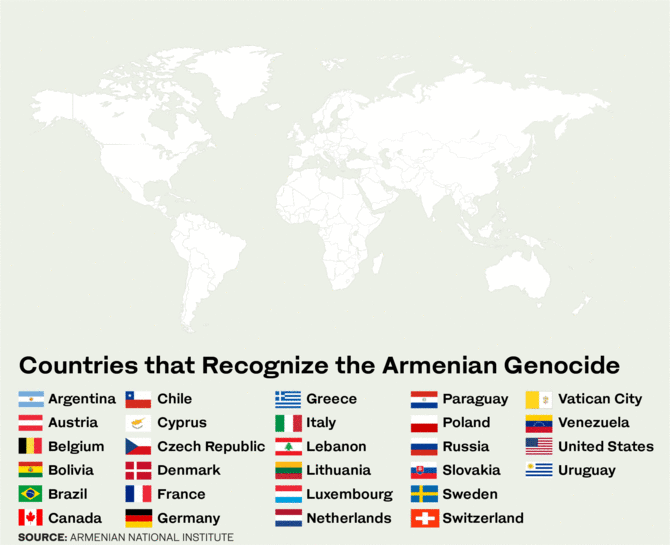ANKARA: Tensions between Washington and Ankara may be further strained on Saturday when US President Joe Biden is expected to become the first US leader to officially recognize the Armenian Genocide of 1915 onward.
The massacre of around 1.5 million Armenians in the early 20th century was formally recognized as genocide by the US Senate in 2019, but then-President Donald Trump did not follow suit.
April 24 is Armenian Genocide Remembrance Day, and ahead of Saturday’s annual commemoration, this much-anticipated move is now a major concern for Ankara, and likely to inflame an already tense relationship. Turkey denies any historical connection with the atrocities, since they took place during wartime in the Ottoman period.
Biden, who put human rights at the center of his presidential agenda, promised to recognize the Armenian Genocide during his campaign. Vice-President Kamala Harris hails from California, where more than 200,000 Armenians currently reside. Forty US lawmakers, led by Senate Foreign Relations Committee Chairman Bob Menendez, recently sent a letter to Biden urging him to follow through on his promise.
The fact that a scheduled phone call between Biden and Turkish President Recep Tayyip Erdogan has been delayed until after Saturday has been taken by many as a sign that Biden will recognize the genocide and trigger outrage in Ankara.
Previous US presidents avoided using the word genocide when commemorating the mass killings, falling victim to realpolitik to avoid destroying America’s relationship with a NATO ally.
On April 20, Turkish Foreign Minister Mevlut Cavusoglu said any official recognition by Biden of the mass killings of Armenians during Ottoman times as genocide will seriously undermine the relationship between the two countries. “If the US wants to worsen ties, the decision is theirs,” he said.
Turkey and the US have been at loggerheads over several issues in recent years, including Turkey’s acquisition of Russian-made S-400 missile systems and its worsening human rights record, with several US nationals being arrested on terror-related charges.
“Not only is anti-Erdogan feeling in Washington intense — especially in congress — but the previous willingness to make concessions to Erdogan because of Turkey’s NATO membership seems to have now disappeared,” Wolfango Piccoli, co-president of Teneo Intelligence, said on Thursday.
“Relations between Turkey and the US have been on a steady downward trajectory for almost 10 years. The possible recognition of the Armenian genocide will exacerbate discomfort amid continuing friction in US-Turkey relations, but will not constitute a breaking point,” he continued.

Biden’s anticipated declaration is expected to inspire dozens of other countries to follow suit. Currently, more than 30 countries have recognized the mass killings of Armenians as genocide.
Soner Cagaptay, director of the Turkish Research Program at The Washington Institute, believes Biden’s intention to recognize the Armenian Genocide highlights the changing attitudes in the US establishment toward Turkey, with both Democrats and Republicans now pressuring Biden to acknowledge the genocide.
“It is not the first time that a US president has come to office with a campaign promise to recognize the Armenian Genocide. But, once they come to office, they immediately face a barrage of US government officials and agencies insisting that (the need to maintain) US-Turkish ties outweighs any campaign promise,” he told Arab News. “But that is not the case this year.”
According to Cagaptay, there are currently very few US government departments that are well-disposed toward Turkey.
“Contrary to the past — when it was its biggest fan — the Pentagon is arguably now Turkey’s main adversary in Washington. Congress wants to punish not only Erdogan, but also Turkey. It wants tough language and tough measures against Turkey. Biden will (recognize the genocide),” he said.





























